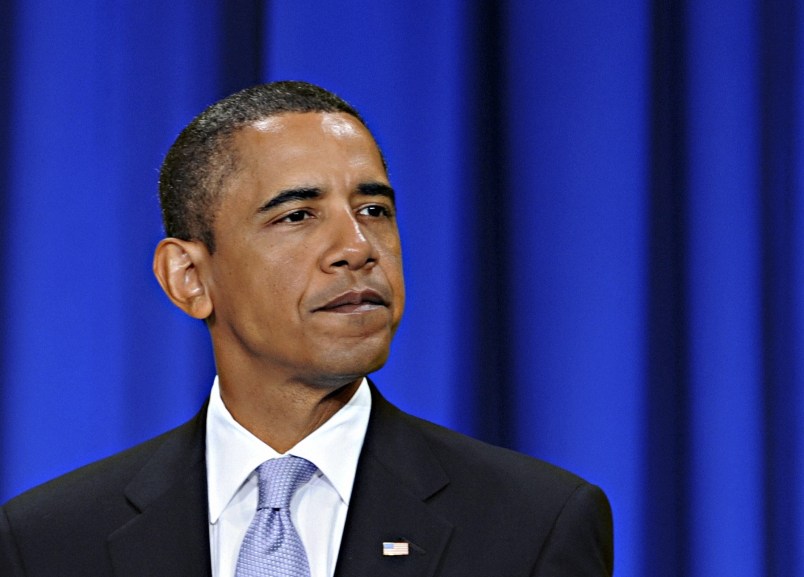Barack Obama will face a daunting challenge Thursday evening when he attempts to focus the government’s attention away from consolidating the federal budget, and back on to immediate job creation. Here’s a partial list of hurdles: Republicans oppose all new spending, unless it’s offset by cuts to key federal programs; they oppose most of the specific spending measures that experts say would create jobs; many Democrats, scared of their own shadows, won’t support anything that doesn’t have bipartisan support; the public has soured on Keynesian spending policies, and particularly the word “stimulus”; and the White House, quite understandably, doesn’t want to be left fighting for a policy that voters oppose from the outset.
To put things in starker relief, no less than his presidency and the economic fate of millions of Americans is at stake.
That’s a tall order — but it is, in part, one of Obama’s own making.
Progressives argue endlessly and insolubly about what Obama and the Democrats have done right and wrong. Most of these arguments rely on counterfactuals so complex they make rendering conclusive judgment impossible. But one piece of Obama’s legacy was locked into place early in his administration — possibly even during his candidacy — and it has proven to be a significant error: the decision to make deficit reduction an urgent priority when the jury was still out on the strength of economic recovery; indeed when early signs hinted at a long, painful slog.
Yes, Obama’s vision for American austerity is less regressive (or more “balanced”) than the GOP’s. But nobody made him pitch for austerity in the first place. Here’s The New Republic‘s Jonathan Chait, writing in the New York Times, missing that key point: “Republican opposition has proved immune even to persistent and successful attempts by Obama to mobilize public opinion. Americans overwhelmingly favor deficit reduction that includes both spending and taxes and favor higher taxes on the rich in particular. Obama even made a series of crusading speeches on this theme. The result? Nada.”
This is true as far as it goes, but it treats the country’s underlying appetite for deficit reduction as an immutable fact of American politics — as legislative fait accompli.
The reality, unfortunately, suggests the public only recently came to prioritize deficit reduction over other key policy goals, and only after a long public offensive — waged most strongly by Republicans but supported in broad terms by Democrats — to convince voters that current deficits and debt are high enough to constitute a crisis.
In early 2009, Obama turned from stimulus to health care, and by insisting the reforms reduce deficits he locked his most effective recovery tools in a policy shed and handed the key to his political enemies. They were famously unpersuaded by the gesture, and instead (falsely) portrayed the bill as a budget buster — an early salvo in a campaign to blame Obama and Democrats for soaring deficits, which of course were almost entirely attributable to the Bush-era financial crisis and recession.
By late October 2009, according to Gallup, 14 percent of the public thought the President’s top priority should be the deficit, double what it had been at the end of Bush’s term. The same poll found 41 percent of the country thought the economy should be his top priority — down from 64 percent in 2008, before the stimulus had helped end the country’s employment free fall. The wars in Iraq and Afghanistan and health care also bested the deficit. Other polls showed similar figures, though many asked questions in different ways, and still others asked respondents to name their top economic priorities. Jobs always trounced the deficit, but public concern was starting to bud. Prior to about 2009, the deficit wasn’t even listed as an option on similar polls.
In his 2010 State of the Union, Obama announced a discretionary spending freeze. “[F]amilies across the country are tightening their belts and making tough decisions,” he announced. “The federal government should do the same.”
In the year and a half since, “stimulus” has fallen into political disrepute, jobs have remained a high priority for the country, and anti-deficit mania has climbed. In 2011, Public Policy Polling began tracking support for the latter two as a zero-sum matter: which should be President Obama’s top priority?
Here are the results, courtesy of DailyKos:

The gap has narrowed dramatically. And since Congress has rendered itself unable to pass anything that will boost employment, members are left to address the one issue on which they have at least some common ground. Predictably, the impact has been to exacerbate the jobs crisis; to confuse the public; and leave Obama and the Congress near the nadirs of their popularity.
As Greg Sargent has noted repeatedly, politicians and elites have created a “deficit feedback loop.” In the midst of a jobs crisis, voters hear that deficits should be the top priority, assume therefore that the two problems are related, and thus demand more deficit reduction. The cycle continues and amplifies. This phenomenon is known to political scientists as “agenda setting,” and though the media is the key intermediary in the process, reporters and opinion makers largely take their cues from the politicians they cover — Obama perhaps chief among them.
That’s why he’s stuck now with the unenviable task of disjoining these two concepts in the minds of voters who never should have entangled them in the first place.
Get the day’s best political analysis, news and reporting from the TPM team delivered to your inbox every day with DayBreaker. Sign up here, it takes just a few seconds.










